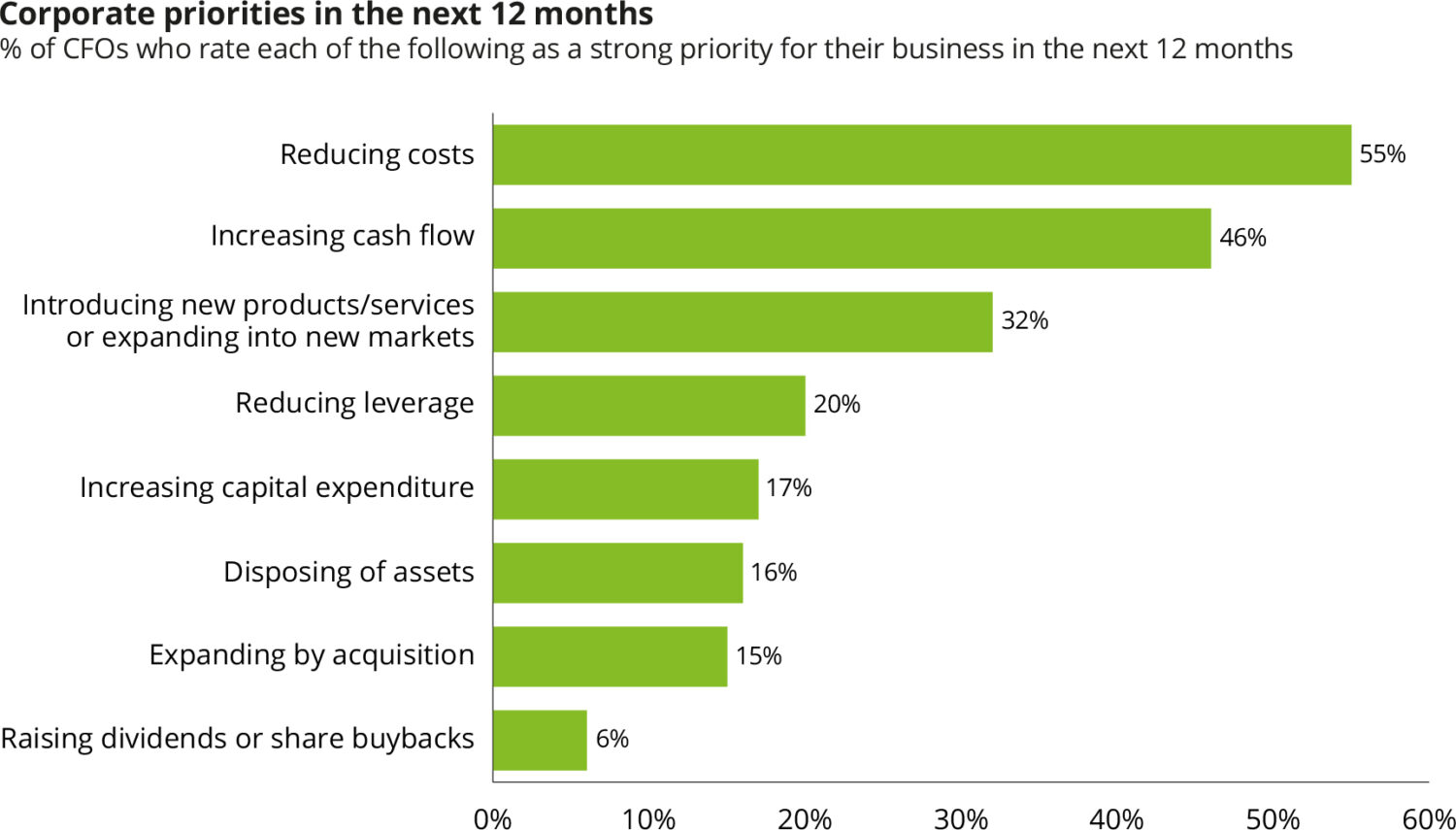The cost conundrum: Unlocking business performance through sustainable cost transformation
CFOs need to address their business' major areas of spend and challenge long-held views if they are to deliver double digit business performance improvement
CFOs need to address their business' major areas of spend and challenge long-held views if they are to deliver double digit business performance improvement
In today’s challenging economic environment, businesses are under ever-increasing pressure to reduce their costs and improve business performance.
According to the latest Deloitte CFO Survey, 55% and 46% of UK CFOs rate cost reduction and increasing cash flow as their top priorities respectively over the coming 12-months.
Keeping control of costs has always been top of mind for finance leaders, but this has become even more important with salary and wage inflation to meet the rising cost of goods and services, and challenging revenues in many industries.
But cost reduction is never easy. Traditional approaches typically focus on cutting costs in a piecemeal fashion or within individual functions such as finance, IT or HR – with limited consideration of the overall impact on the business. As a result, this often leads to short-term savings, that are quickly eroded by rising costs.
Added to this, many businesses have endured multiple rounds of cost reduction in recent years, leading to ‘cost fatigue’ among leadership and the wider workforce. Repeated cost exercises can damage employee morale, retention, and productivity, putting significant ongoing pressure on employees and line management.

This is all in the challenging backdrop of businesses needing to continually balance the trade-off between satisfying investors with financial performance, whilst meeting their wider regulatory, social impact and sustainability commitments.
Amid the ongoing economic uncertainty, many have started or will soon embark on the next wave of cuts. However, adopting previous approaches alone is likely to lead the same poor outcomes. Instead, businesses should consider a fresh approach to their costs and make a step change in business performance.
By adopting a more holistic and strategic approach across the organisation, businesses can develop a more sustainable, resilient, and flexible cost base. This also creates greater financial flexibility which, in turn, enables businesses to pursue new strategic opportunities, such as launching new products, targeting new customer segments and investing in new capabilities.
This approach requires businesses to pursue opportunities which span across functional boundaries, challenge long-held views, address large cost areas that many know about but avoid, and make difficult strategic decisions. Applying traditional cost levers such as freezing recruitment, reducing contractor spend, and removing management layers within functions such as risk and operations still remain valid.
However, this siloed approach does not identify cost synergies that may exist between different parts of the business and in our experience represent the greatest value. For example, many banks are re-orientating and simplifying internal functional teams around a ‘customer journey’ aligned model where products and teams from across the business are all geared around meeting customer needs. Not only has this change led to a positive impact on customer experience, but it has also generated significant savings.
In parallel, businesses need to address their major areas of spend and challenge long-held views if they are to deliver double digit business performance improvement. As part of a holistic approach, it is essential that leaders come together to tackle the known but typically avoided areas and challenge their organisations to drive true efficiency.
For example, many businesses have efforts underway to simplify their high financial crime and fraud control costs across the organisation, without impacting their overall compliance. As another example, organisations are adopting a “digital-first” approach using technology to challenge and remove hidden inefficiencies in seemingly effective processes, while improving customer satisfaction scores.
From our experience, establishing cost discipline is key to improving and sustaining business performance. Cost discipline needs to be at the heart of the organisation’s culture and is achieved by establishing the right conditions for success, including a clear vision, aligned leadership and shared objectives.
For example, in the insurance sector executives are looking to improve underwriting performance by aligning the business around a compelling vision for the expense base, in line with the long-term business plan and establishing shared incentives to drive accountability and the right behaviours.
Furthermore, businesses are investing in digital tools to develop, track, diagnose and regularly refresh a granular and transparent view of their costs. This generates valuable data-led insights and enables firms to discover new areas where efficiency can be found, and take appropriate action.
For example, a global investment bank initially used a cost diagnostic tool across the organisation to identify savings opportunities, and now uses this capability on an ongoing basis to manage and allocate costs in a sustainable way. True success requires leaders to establish and maintain a cost-conscious culture which embeds costs into all business decisions and removes the cyclical and tactical approach often used.
Delivering cost transformation is not easy, but it is essential for businesses to adopt a more sustainable approach to thrive in both today and tomorrow’s market.
